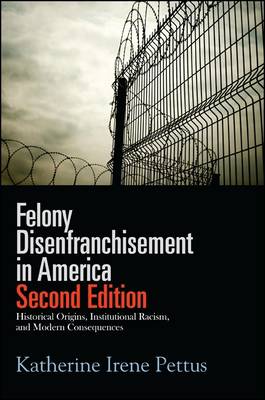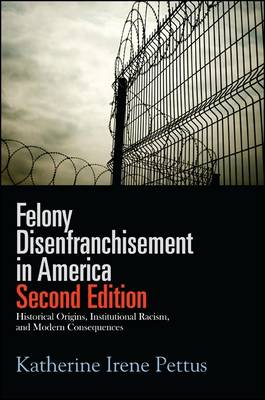
- Afhalen na 1 uur in een winkel met voorraad
- Gratis thuislevering in België vanaf € 30
- Ruim aanbod met 7 miljoen producten
- Afhalen na 1 uur in een winkel met voorraad
- Gratis thuislevering in België vanaf € 30
- Ruim aanbod met 7 miljoen producten
Felony Disenfranchisement in America, Second Edition
Historical Origins, Institutional Racism, and Modern Consequences
Katherine Irene PettusOmschrijving
Reveals how state felony disenfranchisement laws are undermining American democracy.
State felony disenfranchisement laws that date back to Reconstruction fracture the American electorate into "those who are citizens in the fullest sense of the term," in Aristotle's words, and those who, deprived of political voice, still have the status of slaves. The existence of this "invisible constituency"-approximately 5.8 million or 2.5% of the national voting population-who live alongside the "ruling" enfranchised electorate-is one of the scandals of our generation. In this second edition of Felony Disenfranchisement in America, Katherine Irene Pettus draws on philosophy, history, law, and punishment theory to make the compelling argument that state disenfranchisement policies have collective moral and political significance that transcends the personal tragedy of being legally deprived of full citizenship status. Pettus argues that the war on drugs, mass incarceration, and racially unbalanced disenfranchisement rates distort and disfigure the body politic as a whole, and undermine the legitimacy of the domestic and foreign policies promulgated by our elected representatives.
Specificaties
Betrokkenen
- Auteur(s):
- Uitgeverij:
Inhoud
- Aantal bladzijden:
- 296
- Taal:
- Engels
- Reeks:
Eigenschappen
- Productcode (EAN):
- 9781438447209
- Verschijningsdatum:
- 1/04/2013
- Uitvoering:
- Paperback
- Formaat:
- Trade paperback (VS)
- Afmetingen:
- 137 mm x 242 mm
- Gewicht:
- 399 g

Alleen bij Standaard Boekhandel
Beoordelingen
We publiceren alleen reviews die voldoen aan de voorwaarden voor reviews. Bekijk onze voorwaarden voor reviews.








